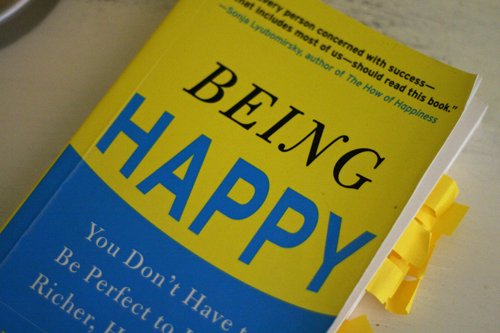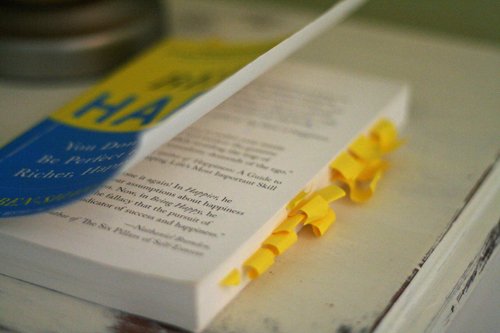If so, this book may help.

This past summer I had the opportunity to review the book Being Happy: You Don’t Have to Be Perfect to Lead a Richer, Happier Life by Tal Ben-Shahar. Now I get a lot of requests to do book reviews—far more than I have the capacity to do. So I have to be selective. I say yes to books that are on a topic of personal or professional interest, and I say yes to books that I know will be a valuable resource for my workshop customers, clients and blog readers. And that, my friends, is what made this book an immediate yes. Perfectionism is an important topic to me personally as well as to so many of the people who take my workshops and who work with me one-on-one. Perfectionism leads to procrastination and often paralysis—which are huge contributors to clutter and disorganization. As we seek the perfect organizing solution or the perfect set of scenarios upon which to get started on our organizing journey, we procrastinate. This procrastination leads to a build up even more clutter…which so often leads to feelings of overwhelm and paralysis. See why this topic is important?
On a personal level, this book resonated with me, too. I’ve often referred to myself as a recovering perfectionist. I remember back in school the subjects that had clear-cut, black and white answers (like math) were my favorite. I had a way of knowing I was doing it right. I had a way to measure my performance and know if I was staying inside the lines or not. Ironically, subjects like writing were outside of my comfort zone. How could I know that I was writing the best possible story? How could I know I was getting it right? That I was getting it perfect? I couldn’t…and that was really uncomfortable for me. I was also raised by a well meaning and very loving perfectionist too. So I have seen firsthand how striving to do everything perfectly is the perfect path to unhappiness.
On so many levels this book spoke to me at the get-go. So I picked it up with high expectations. As I devoured the pages of the book…I wasn’t disappointed. As you can see…I found many brilliant takeaways and nuggets I want to remember, apply in my own life, and share with others.

One of the things I particularly love about this book is that the author Tal Ben-Shahar is not only a Ph.D. who has extensively researched perfectionism, but he is like so many of us, also a recovering perfectionist. Throughout the book he shares personal stories about how his pursuit of perfection robbed him of happiness and how he has now learned to be happy without leading a perfect life.
Early in the book Tal Ben-Shahar introduces the term “optimalism.” He explains that today psychologists differentiate between “positive perfectionism, which is adaptive and healthy, and negative perfectionism which is maladaptive and neurotic.” He uses the term optimalism to describe positive perfectionism.
This excerpt from the book sums up the difference between perfectionism and optimalism nicely. “The Perfectionist expects her path toward any goal—and indeed her entire journey through life—to be direct, smooth, and free of obstacles. When, inevitably, it isn’t—when for example she fails at a task, or when things don’t quite turn out the way she expected—she is extremely frustrated and has difficulty coping. While the Perfectionist rejects failure, the Optimalist accepts it as a natural part of life and as an experience that is inextricably linked to success.”
What I found to be extremely encouraging is that perfectionism and optimalism are not absolute. In other words, none of us are 100% a Perfectionist or 100% an Optimalist. (Which is great news, don’t you think?) Instead, think of perfectionism and optimalism as lying on a continuum, and think of each of us as tending to fall on one end of the continuum or the other. And where we fall on that continuum varies for different aspects of our life. We may tend more toward perfectionism in our professional life, for example, but be closer to the optimalism side of the continuum in our personal pursuits (or at least some of them.)
The book goes onto describe the many consequences of perfectionism and gives practical ideas and action steps to move in the direction of optimalism. I now like to think of myself not as a recovering perfectionist but instead as an evolving optimalist. I like how that feels. And the book has terrific insight and exercises to help me on my journey.
If you’re procrastinating getting started on your organizing journey, or if you’re to the point of being paralyzed, I invite you to explore if perfectionism may be at play. This book is an excellent tool to help you do just that. Perhaps you may soon, like me, think of yourself as happy and evolving optimalist.
If you’ve read this book already, I’d love to hear from you. What were your takeaways? Which concepts from the book most resonated with you?

LOVE this:
“I have seen firsthand how striving to do everything perfectly is the perfect path to unhappiness.”
Me too, and your quote will help me to remember why trying to be perfect is a waste of my time!
I feel bad admitting this to you, but even tho you are in my reader I usually do a very quick skim over your posts. But now I see why! This is me to a T! I get so overwhelmed and don’t get one single thing accomplished. As the years have gone by I’ve just given up and stopped even trying. I am definitely going to read this book. Thank you.
oh and math was my absolute fav class in school and I’ve been a bookkeeper for 30 years. hmmmm 🙂
Oh, I am so buying this book!
Kind of all boils down to just doing what makes you happy, not doing what you think other people think you should be doing. An authentic life is a life well lived.
Another great book is Forget Perfect by Lisa Earle McLeod. I’m just finishing it and it has been so helpful. She’s not a PhD but approaches it from a really common sense standpoint. I’m a creative type who comes up with great ideas but never executes on them because I don’t think it will turn out good enough, so I’m devouring books like these right now; thanks for the recommendation!
Oh my gosh, Adrianne, what you said describes me as well: “I’m a creative type who comes up with great ideas but never executes on them because I don’t think it will turn out good enough.” But maybe I have a touch of OCD too, because I looked at the picture of the book with the tabs sticking out and got nervous … I immediately thought that I would color code and use Post-It tabs so it looked neater. I’ve got to learn that stuff that doesn’t matter as much should just be left alone and it’s OK to say it’s “good enough”.